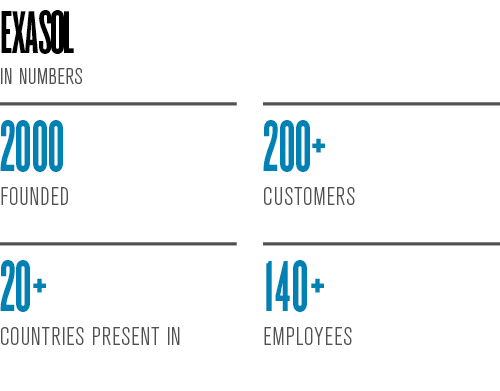
Today, there is an abundance of data available to businesses. Those that make good use of this resource stand to profit, but companies must assess how best to manage, store and analyse the information at their disposal. There are internet cookies, social media posts, wearable trackers and more, all harvesting data on potential customers. But deciding what information is useful and what is just noise is difficult.
This is where firms like Exasol can offer huge benefits: the German company’s high-performance, in-memory analytics database can provide businesses with actionable insights by analysing hundreds of terabytes of data in milliseconds. Over the past 20 years, Exasol has worked with organisations all over the world, picking up awards and plaudits along the way.
With businesses waking up to the importance of finding the right database analytics provider, Exasol’s competition is set to grow
Since 2013, a significant chunk of the company’s success must be attributed to its CEO, Aaron Auld. Since Auld took charge, Exasol has claimed a number of success stories, including several strategic partnerships and a place on the 2019 Tech Tour Growth 50 shortlist. With businesses waking up to the importance of finding the right database analytics provider, Exasol’s competition is set to grow. Having already stood toe to toe with the likes of Microsoft, Oracle and IBM, Auld and his company are ready to meet the challenge.
Up to date
The database arena is a keenly contested one, fought between huge technology multi-nationals and countless smaller players. Since its founding in 2000, Exasol has certainly had its fair share of ups and downs – in fact, at one point, it even looked as though the company might not make it.
“When I joined the company, it consisted of about 30-odd developers and one customer,” Auld told European CEO. “When the financial crisis hit in 2008/9, we lost this customer, which reduced our revenue to just about zero. After that, we had to fight for funding and customers. In 2010, we got Adidas, Olympus and Sony Music on board, and if we hadn’t managed to do this then I think the company wouldn’t have survived. We wouldn’t have had the arguments to convince investors or banks. But we’ve been adding customers ever since.”
Exasol has been able to attract more customers over the years thanks to its superior product offering. “Analytics covers a broad range of tools and technologies, but central to everything is where the data is stored,” Auld said. “And that’s what we do: we deliver that database for our customers. But what’s unique about our offering is that we are the only company in the world that has managed to develop a database which uses the incredible power of RAM [random access memory] the way we have, which is where really high-speed processing happens.”

The benefits of running a database on RAM are that it is much faster than any traditional disc-processing database. In-memory databases do not suffer from input-output bottlenecks, meaning they offer a more streamlined process. RAM databases also reduce memory consumption by eliminating multiple data transfers and minimising CPU demands.
“The speed that we are able to deliver is important because, if you remember how companies used to operate, they used to do weekly reporting or monthly reporting,” Auld said. “They would take a look back at sales numbers, for example, and gain a retrospective view of what was happening. Now, analytics has become much more important for companies to understand their own business, to understand the market and to understand what’s going on. For that, you need to have analytics that works practically in real time, which is why our offering is proving so popular with customers.”
The innovation cycle is getting shorter, and businesses are beginning to understand the implications of this. Larger enterprises that previously thought they could plan their IT projects five years ahead of schedule now realise that such plans are likely to be obsolete by the time they are implemented. Having access to faster, more reliable data is the key to innovating more quickly and gaining a competitive edge. This is exactly what Exasol provides.
Put to good use
Perhaps unsurprisingly given the ubiquitous nature of data in the modern world, Exasol’s customers can be found in every business sector. Global dating app Badoo, for example, utilises a 20-node Exasol cluster that stores and analyses 350TB of data to underpin its business intelligence infrastructure. Fintech firm Kreditech, meanwhile, uses Exasol to reduce the time required to fulfil its analytics queries to just under two hours – a dramatic improvement on the 24 hours they took to run previously. These are just two of a diverse range of businesses making use of Exasol’s technology.
“E-commerce companies are organisations that we have had great success with, as they can very easily see the advantage of having such a powerful database – everyone in e-commerce knows that every delay means losing customers,” Auld said. “But we also have customers in many other sectors as well. So, in the financial services industry, next to newcomers like Revolut, we have what you might call more traditional companies, such as Allianz Life, Generali and other financial institutes. We also have customers in retail, utilities and logistics. Essentially, anywhere where businesses are experiencing higher and higher levels of complexity [and] more and more competition, we have found a willing customer base.”
More data means better insights, which can help organisations assess the work they are already doing or come up with innovative ideas
One of the reasons Exasol has found such broad appeal is the utility of data itself. Regardless of the industry, more data means better insights, which can help organisations assess the work they are already doing or come up with innovative ideas. The applications are endless – as are the benefits.
“We have some very interesting corporate projects around an area that we call ‘data for good’,” Auld explained. “For example, we work with Path, an organisation based in Seattle that has been around since the 1970s… They work specifically on women’s healthcare, with a number of projects in Africa. One of these that we’ve been working with them on is called Visualise No Malaria. Zambia aims to eradicate malaria in the country by 2021, using the combined expertise of public health organisations and private sector technology partners. We joined the project in 2017 to contribute database technology and help Zambia achieve its aim.”
For individuals not based in the technology sector, obsessing over data can seem a little boring. But often what is truly interesting is not the data itself, but what can be done with it: as Exasol’s projects demonstrate, it can have truly transformative implications for individuals in need of social or economic support.
Staying secure
The use of privately procured database technology comes with its own challenges, however: as more personal information gets stored by governments and businesses, protecting it becomes increasingly important. Information relating to an individual’s health or financial situation, for example, is potentially attractive to cybercriminals. Making sure such data does not fall into the wrong hands is, therefore, critical.
“We are heavily involved in the security of our clients’ data,” Auld said. “We have a very experienced information security manager that has created a risk profile of everything we do. So we are constantly identifying potential risks and then doing what we can to make sure that we have those risks under control… Our customers are doing the same, usually at a much greater scale because they may be bigger than us, and so have more data and more processes to contend with. And because we are where a lot of customer data is being stored, we are working with our customers constantly on various security measures to make sure that our database is not the source of potential vulnerabilities.”
The rise of cloud computing is adding another element to the data security puzzle. For a number of years, there were question marks hanging over the security of cloud computing compared with on-premise data storage. These fears have largely been allayed, and ExaCloud – a database-as-a-service solution provided by Exasol – includes secure access via site-to-site virtual private networks, data encryption and other security measures to reassure customers. Today, the decision of whether or not to migrate to the cloud is likely to hinge on matters other than security.
“Until recently, most companies’ IT infrastructures have been very monolithic, provided by Oracle, SAP or IBM, and it was very difficult to move away from those kinds of large-scale setups,” Auld said. “But the cloud provides an opportunity to do that.”
The cloud delivers flexibility and agility. In order to gain access to additional analytical capabilities, businesses can go directly to the cloud and spin up whatever they need, without requiring additional capital investment. Security issues may never go away completely, and firms may wish to keep some of their core processes within their own firewall, but the cloud is an option that more business are considering. At Exasol, it is an approach the firm is happy to support, while still offering on-premise and hybrid solutions.
People power
With all the talk about data, it’s important to remember that, ultimately, people decide what to do with it. Analytics solutions can derive insights in a fraction of the time it would take an individual to do so manually, but human input is required to act upon these insights.
“Human capital remains massively important,” Auld said. “There’s one way of looking at things that says that data is the single most important resource but, at the end of the day, everything that we do has a human context. And I think right now, especially when you have a crisis like the coronavirus pandemic that we’re going through currently, it’s important to remember that people are often more important than processes or data.” The sort of people that Exasol recruits have to be passionate about what they do and willing to take on responsibility, with an eagerness to understand how the process they are working on connects with other operations at the company.
“I am both a victim and a beneficiary of today’s always-on technology,” Auld explained. “There’s always something going on, so often I will connect with colleagues in the US after I’ve finished in the office. And many other individuals that work for Exasol are the same – it’s not something that I demand, but technology allows you to always be switched on if you want to be.”
As Exasol looks to continue its expansion in the coming years, the engagement that Auld seeks from his employees will undoubtedly prove useful. Data may be what the company has built its reputation on, but it’s only as good as the people in charge of it.

